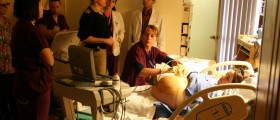Women who fall pregnant and are not certain who the baby's father is are bound to be a little distressed about the situation. The potential fathers, too, may wish to find out whether they are going to become a dad as soon as possible before the baby is born. The days that "paternity testing" consisted of examining whose nose the baby has are long gone, and there are now several prenatal paternity testing options available.

Amniocentesis
This procedure is relatively common these days, especially in women over 35. It is generally used to find out if the baby has any chromosomal abnormalities. Amniocentesis also provides information about neural tube defects and genetically linked diseases, as well as about the gender because the cells collected from the amniotic fluid contain the baby's DNA. Amniocentesis is one of the prenatal paternity testing options, but there are some risks involved. Amniocentesis involves collecting a sample of the amniotic fluid by inserting a large needle into the uterus, through the mother's abdomen. There is a chance of preterm labor or miscarriage, and a small risk of the baby being harmed by the needle. An amniocentesis can be performed from weeks 14 through 20 of pregnancy.
CVS Chorionic Villus Sampling
Again, CVS is a prenatal test that primarily aims to detect birth defects. In the case of Chorionic Villus Sampling, a needle will be used as well, but this time to collect a sample of the chorionic villi, which are attached to the baby's placenta. CVS is usually carried out by instering a needle through the cervix, but it can also be done through the abdomen. The results of CVS are available more quickly, and the procedure can be done earlier on in pregnancy, from 10 weeks onward. CVS does carry a small risk of miscarriage, like amniocentesis. It is not recommend to women who have sexually transmitted diseases or experienced pregnancy spotting.

















Your thoughts on this
Loading...